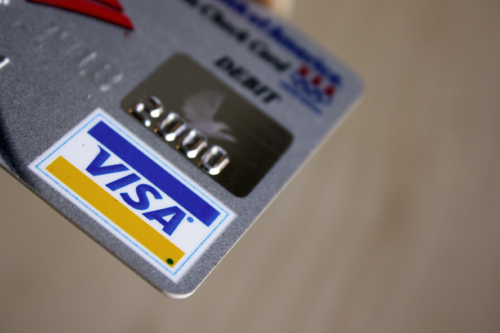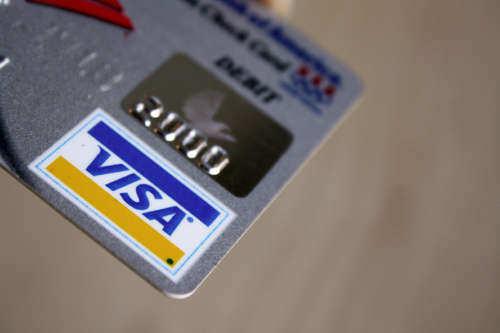
Did you know that if your business works with Visa, and you sign up for the recently-announced “Cashless Challenge ”, you could win 10 000 dollars? All you need to do is sign up, start telling your customers you refuse to take their payments in cash, and if your number is drawn, Visa will reward you for having made the world more modern with a check for 10 000 dollars. Okay, maybe not a check, perhaps something more modern and high-tech. In the summer of 2017, Visa launched the initiative, seeking to seize the opportunity of an increased pressure on cash to increase its sales figures. "We're declaring a war on cash," Andy Gerlt, a spokesman for Visa, said on the announcement day.
Over the past years, the cash share of economies in the world has slowly been depleted. What was initially a choice of consumers, who saw in contactless and virtual payments a source of ease and convenience, became an economic theory. Kenneth Rogoff became one of the champions of this theory, claiming : “if implemented slowly and with the appropriate infrastructure in place, going cashless could even help to remedy exploitation of migrant laborers working in more developed countries, who often receive under-the-table payments that leave employers unaccountable”, as well as curb crime rates and tax evasion. Governments started supporting the theory, in the hope that cashless societies would help them curb tax evasion and increase their controls. Last November, India turned this spontaneous into a legal obligation to go cashless, when it cancelled most of its own money in order to force its citizens into financial submission. So, now that governments are keen to go cashless, Visa figures that the iron is hot and should be beaten.
In fact, Visa isn’t the only economic player trying to get rid of cash, as many others have joined the cause and now coordinate their lobbying efforts to bring the entire economy under their control. Banks, large businesses, financial companies, government agencies are mostly in favour of the disappearance of cash, but try to keep the matter out of public debate, fearing their populations may detect the potential loss of liberty. The economic argument in favor of going cashless is that economic policies are ineffective on cash transactions. Going cashless is therefore the best way for our economies to be steered by economic policies, avoiding inflation and deflation, for instance. In a cashless world, if government economists consider that spending must be boosted, they will simply start taxing your savings (as they have already started doing) to force you to spend. The political argument is that if all monies are transparent, tax evasion will disappear, tax revenues will increase, and the burden of taxation will be better shared. More modern, convenient and rewarding, what’s not to like?
There is a lot to dislike, in fact, according to civil rights institutions, who fear the orwellian future which a cashless society could bring. Jess Hicks, a civil rights activist, advocates : “The drive toward a cashless society is not just one toward frictionless, convenient exchange, but one where every exchange can be accounted, examined, acted upon. To create that realm of total surveillance, cash must be brought to heel.” The risks come in many forms: investment risk, economic risk and, most of all, political risk. While it is indeed true that economic policies would be more effective in a cashless world, it disregards what the individual citizen wishes to do with his money. If he or she doesn’t wish to spend at that moment, a financial sanction will be applied through taxation. In addition, because virtual transactions are logged and traceable, it will silently hand over an enormous amount of information about unsuspecting citizens, their purchases, their whereabouts, their partners, their activities, etc. In short, it would hand banks and governments an unprecedented level of power to control citizens - with no guarantees as to what they would with that power.
Finally, a cashless world places clients between banks and their trouble: if the economy starts degrading, clients would no longer be able to withdraw their savings in cash to secure them, and their money would then be used by the banks to pay off their debts. So, even if most small companies don’t like credit card companies, they would be forced to sign with them. Henry Grabar writes for Slate : ”Independent businesses don’t like credit card companies. According to a 2016 survey of independent retailers conducted by the Institute for Local Self-Reliance, the median share of revenue spent on swipe fees was 3 percent.” In a cashless world, they wouldn’t have to like it, they would just have to sign.
According to civil liberties watchdogs, Visa has found the price of liberty: 10,000 dollars, maybe. The peculiarity of the ongoing debate is that both sides are fairly correct in their assessments. Banks, governments, and virtual payment companies are pretty much unchallenged in their claims that an economy would benefit, in some regards, the suppression of hard currency. Civil rights NGOs are equally correct in their predictions that it would give States and corporations dangerously high levels of power to monitor, control and pressure citizens. The debate will therefore eventually boil down to this question to citizens: what matters more, being rich or being free?
Over the past years, the cash share of economies in the world has slowly been depleted. What was initially a choice of consumers, who saw in contactless and virtual payments a source of ease and convenience, became an economic theory. Kenneth Rogoff became one of the champions of this theory, claiming : “if implemented slowly and with the appropriate infrastructure in place, going cashless could even help to remedy exploitation of migrant laborers working in more developed countries, who often receive under-the-table payments that leave employers unaccountable”, as well as curb crime rates and tax evasion. Governments started supporting the theory, in the hope that cashless societies would help them curb tax evasion and increase their controls. Last November, India turned this spontaneous into a legal obligation to go cashless, when it cancelled most of its own money in order to force its citizens into financial submission. So, now that governments are keen to go cashless, Visa figures that the iron is hot and should be beaten.
In fact, Visa isn’t the only economic player trying to get rid of cash, as many others have joined the cause and now coordinate their lobbying efforts to bring the entire economy under their control. Banks, large businesses, financial companies, government agencies are mostly in favour of the disappearance of cash, but try to keep the matter out of public debate, fearing their populations may detect the potential loss of liberty. The economic argument in favor of going cashless is that economic policies are ineffective on cash transactions. Going cashless is therefore the best way for our economies to be steered by economic policies, avoiding inflation and deflation, for instance. In a cashless world, if government economists consider that spending must be boosted, they will simply start taxing your savings (as they have already started doing) to force you to spend. The political argument is that if all monies are transparent, tax evasion will disappear, tax revenues will increase, and the burden of taxation will be better shared. More modern, convenient and rewarding, what’s not to like?
There is a lot to dislike, in fact, according to civil rights institutions, who fear the orwellian future which a cashless society could bring. Jess Hicks, a civil rights activist, advocates : “The drive toward a cashless society is not just one toward frictionless, convenient exchange, but one where every exchange can be accounted, examined, acted upon. To create that realm of total surveillance, cash must be brought to heel.” The risks come in many forms: investment risk, economic risk and, most of all, political risk. While it is indeed true that economic policies would be more effective in a cashless world, it disregards what the individual citizen wishes to do with his money. If he or she doesn’t wish to spend at that moment, a financial sanction will be applied through taxation. In addition, because virtual transactions are logged and traceable, it will silently hand over an enormous amount of information about unsuspecting citizens, their purchases, their whereabouts, their partners, their activities, etc. In short, it would hand banks and governments an unprecedented level of power to control citizens - with no guarantees as to what they would with that power.
Finally, a cashless world places clients between banks and their trouble: if the economy starts degrading, clients would no longer be able to withdraw their savings in cash to secure them, and their money would then be used by the banks to pay off their debts. So, even if most small companies don’t like credit card companies, they would be forced to sign with them. Henry Grabar writes for Slate : ”Independent businesses don’t like credit card companies. According to a 2016 survey of independent retailers conducted by the Institute for Local Self-Reliance, the median share of revenue spent on swipe fees was 3 percent.” In a cashless world, they wouldn’t have to like it, they would just have to sign.
According to civil liberties watchdogs, Visa has found the price of liberty: 10,000 dollars, maybe. The peculiarity of the ongoing debate is that both sides are fairly correct in their assessments. Banks, governments, and virtual payment companies are pretty much unchallenged in their claims that an economy would benefit, in some regards, the suppression of hard currency. Civil rights NGOs are equally correct in their predictions that it would give States and corporations dangerously high levels of power to monitor, control and pressure citizens. The debate will therefore eventually boil down to this question to citizens: what matters more, being rich or being free?





